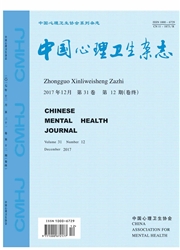

 中文摘要:
中文摘要:
目的:探讨儿童注意缺陷多动障碍(ADHD)成年早期不同结局患者的工作记忆特点.方法:选取64例符合美国精神障碍诊断与统计手册第4版(DSM-Ⅳ)诊断标准的ADHD儿童在成年早期(参加本研究时年龄18 ~24岁)进行随访.依据Conners'成人ADHD诊断会谈定式问卷评定成年早期ADHD的不同结局,对其中的28例成人ADHD患者及21例缓解者以及26例性别、智商匹配的正常成人采用不同工作记忆负荷(0-back、1-back、2-back)的n-back任务测查工作记忆特点,比较成年早期不同结局的ADHD患者在完成任务时的反应时(RT)、正确率和个体内反应时标准差(ISD).结果:三组被试在完成三种工作记忆负荷的n-back任务时,其RT及ISD均随工作记忆负荷增加而增大(P〈0.001),而正确率则随工作记忆负荷增加而减小(P〈0.001),呈现等级变化规律;成人ADHD患者执行n-back任务时RT均长于缓解组[(507.7±79.7)ms vs.(454.8±65.9) ms,P〈0.01]和正常成人组[(507.7±79.7)ms vs.(446.6±52.4) ms,P〈0.01],ISD均大于缓解组[(164.4±33.1) msvs.(142.4±40.9) ms,P〈0.05]和正常成人组[(164.4±33.1) msvs.(141.3±32.2) ms,P〈0.05];成人ADHD缓解者和正常成人执行n-back任务时RT、正确率和ISD之间差异无统计学意义.结论:成人ADHD患者可能仍存在语言工作记忆能力损害,而成人ADHD缓解者的语言工作记忆能力改善至正常水平,提示发育过程中ADHD的缓解可能与额叶功能有关的执行功能的改善有关.
 英文摘要:
英文摘要:
Objective: To evaluate the characteristic of verbal working memory in patients with different early adulthood outcomes of attention-deficit/hyperactivity disorder (ADHD). Methods: A total of 64 subjects, previously diagnosed in their childhood as attention-deficit/hyperactivity disorder (ADHD) by the Diagnostic and Statistical Manual of Mental Disorders, Fourth Edition (DSM-IV), were reexamined in their early adulthood (aged between 18 to 24) at a follow-up assessment. By utilizing the Conners'Adult ADHD Diagnostic Interview, subjects were classifled into two groups with different clinical outcomes, including 28 persistent ADHD subjects and 21 remittent ADHD subjects. A healthy control group of 26 subjects with matched sex ratio and intelligence quotient (IQ) level was also involved for comparison. Together they were tested in an n-back task of 3 working memory load levels (0- back, 1-back and 2-back). The reaction time (RT), accuracy rate and the intra-individual standard deviation of RT (ISD) among the 3 groups were then compared in each load levels. Results: For all the subjects, their performance of RT and ISD increased with the increasing of working memory load level (P 〈 0. 001 ), while the accuracy rate showed an opposite trend (P 〈0. 001). The RT was longer in those with persistent ADHD [(507.7 ±79. 7) ms] than those with remittent ADHD [(454. 8 ±65.9) ms] and than those healthy controls [(446.6±52. 4) ms], P 〈 0. 01. In addition, the ISD was significantly higher in subjects with persistent ADHD [ (164.4 ± 33.1) ms] than those with remittent ADHD [(142. 4 ±40. 9) ms]and healthy controls [(141.3±32. 2) ms], P 〈0. 05. No differ- ences in RT and ISD were found between subjects with remittent ADHD and controls. Conclusion: It suggests that verbal working memory deficit may still remain in patients with persistent ADHD, however not in those with remittent ADHD, in supportive of the hypothesis that recovery over the course o
 同期刊论文项目
同期刊论文项目
 同项目期刊论文
同项目期刊论文
 Methylphenidate normalizes resting-state brain dysfunction in boys with attention deficit hyperactiv
Methylphenidate normalizes resting-state brain dysfunction in boys with attention deficit hyperactiv 期刊信息
期刊信息
